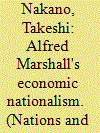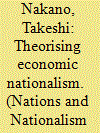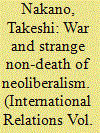| Srl | Item |
| 1 |
ID:
076746


|
|
|
|
|
| Publication |
2007.
|
| Summary/Abstract |
Alfred Marshall has been seen as an economic liberal and one of the founders of the neo-classical school. However, this article challenges such conventional wisdom and argues that Marshall is best understood as an economic nationalist. Economic nationalism has been falsely associated with mercantilism, the zero-sum view of international economies, and so on. However, a new approach for studying economic nationalism has recently been proposed to redefine its conception. The present article shows that Marshall's economic thought is compatible with this new conception of economic nationalism. Marshall emphasised the role of nationality in the economic process. The characteristics of his economic thought, such as the evolutionary view of economy, conform more closely to Friedrich List's economic nationalism than to economic liberalism. By portraying Marshall's theory as that of economic nationalism, the author concludes that economic nationalism can have a systematic theory.
|
|
|
|
|
|
|
|
|
|
|
|
|
|
|
|
| 2 |
ID:
053188


|
|
|
| 3 |
ID:
178493


|
|
|
|
|
| Summary/Abstract |
This essay provides a hypothesis about how geopolitical environments significantly affect the rise and fall of modern economic ideologies. First, it articulates how the two world wars transformed political, social and ideological conditions into those favourable for the rise of Keynesianism. Second, it theoretically identifies the political and social foundations of Keynesianism with expanded state capacity, social cohesion and social equality, all of which were by-products of major wars. Third, it shows how the transformation of geopolitical environments and the change of the nature of warfare since the late 1960s undermined the political and social foundations of Keynesianism and paved the way for the rise and dominance of neoliberalism. By shedding light on military and geopolitical dimensions of international environments, our hypothesis well explains the sudden fall of Keynesianism in the 1970s and the current robustness of neoliberal dominance.
|
|
|
|
|
|
|
|
|
|
|
|
|
|
|
|